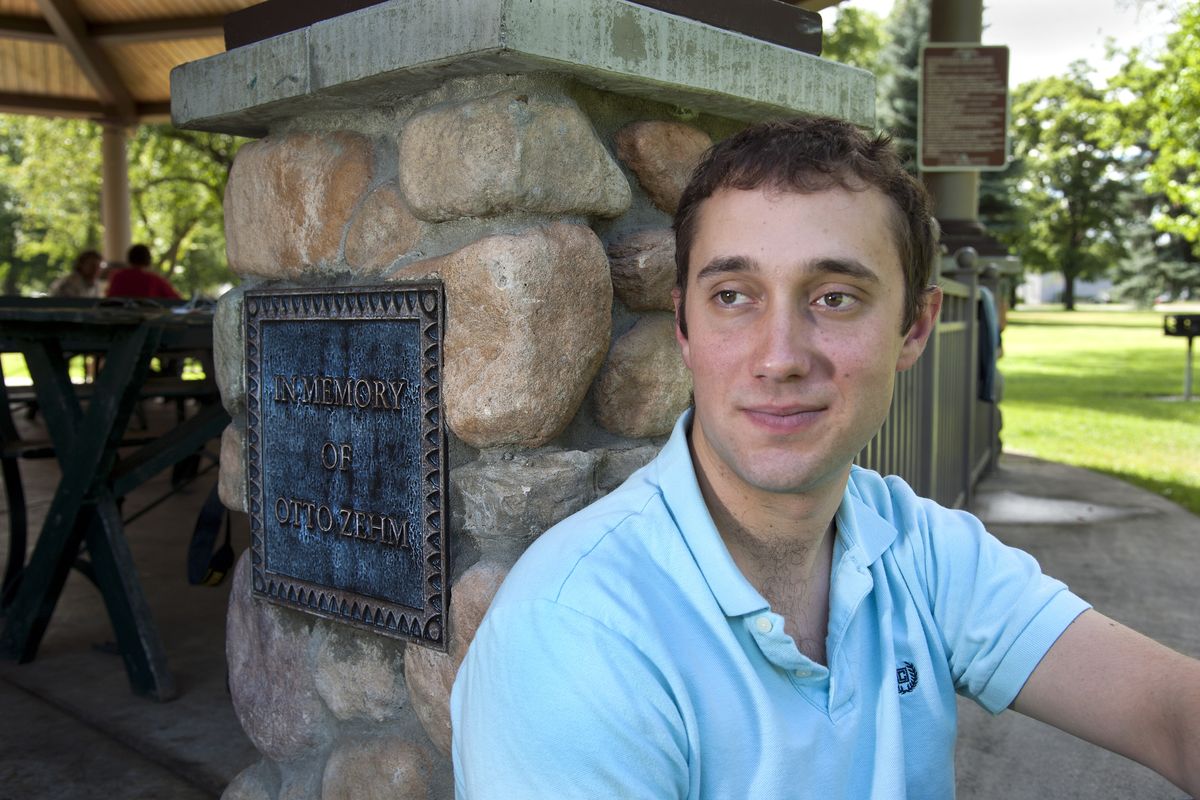This column reflects the opinion of the writer. Learn about the differences between a news story and an opinion column.
Doug Clark: First-time author underscores the importance of the Otto Zehm case

I received a vitriolic voice mail message when I last brought that name up in a column.
“Otto Zehm,” the caller scoffed. “Nobody cares about Otto Zehm anymore.”
I didn’t bother saving the recording, but that’s pretty much the gist.
Well, I beg to differ.
Andrew Gabriel Britt cares.
And if my irate reader can figure out how to navigate a calendar, he should plan to be at Auntie’s Bookstore, 402 W. Main Ave., this Friday at 7 p.m.
Britt, 26, will be there to read from his book, “Frenzy and Cover Up: The Death of Otto Zehm.”
The first-time author will autograph copies of his 275-page, self-published account ($12.95 each), plus answer questions about the case that rocked Spokane to its core.
Here’s how the story is recapped on the back of Britt’s book:
On March 18, 2006, “a Spokane policeman brutally assaulted an innocent man suspected of committing a petty crime. After a horrific struggle, the man suffered cardiac arrest at the scene while in police custody and died three days later.
“The police department tried to sweep the matter under the rug, and the city blamed the victim for his death. It took seven years for a nonprofit law firm, the federal government and an innovative politician to set the matter straight and (put) the police department and city attorney’s office on the proper course.”
Toss in the name Karl Thompson Jr. as the officer who administered the unwarranted beat-down. Add the North Division Zip Trip as the place where this tragedy took place.
And, yeah, that’s as good a brief summation as any.
But when I heard about Britt’s book, I wasn’t interested in rehashing what happened to the 36-year-old janitor who suffered from mental illness.
What intrigued me more was how a kid fresh out of Eastern with a sociology degree came to write it.
It all began, Britt told me, after he graduated in 2012 and couldn’t find work. His father, Bill, a Coeur d’Alene neurologist, came up with an offer that Britt the younger couldn’t refuse: Write a book about Otto Zehm.
Why not?
Both father and son had been riveted by this David vs. Goliath tale that eventually led to a federal jury convicting Thompson for excessive force and lying to investigators about what he had done.
The day those guilty verdicts came in remains one of the most satisfying moments in my career.
Dad Britt agreed to bankroll the project and give his son a stipend to live on while he got it done.
“The entire time I was writing it, I treated it as my job,” the writer said.
And what a job it turned out to be.
Britt burned up six months just to acquire and organize all the pertinent documents: upward of 20,000 pages of media reportage, police investigations and trial transcripts, many of which had to be obtained through public information requests.
Then came the writing, which took another two years.
And the result?
Britt, who will soon enter law school, did an impressive job of assembling a chronological recounting of the case, beginning with a transcript of the 911 call that started it all.
That call came from a teenager and her friend who were scared by Zehm’s peculiar behavior when they encountered him at an ATM machine.
They thought he might’ve stolen money. Or maybe he was high on drugs.
None of that was true, but it was enough to send Thompson like a guided missile to the Zip Trip, where Zehm went next to shop for some junk food.
Britt’s book moves forward in time through the police reports, news stories and all the Big Lies told by city and law enforcement officials who claimed Zehm had instigated the attack by lunging at Thompson with his plastic bottle of diet pop.
“Otto was a very sympathetic victim,” said Britt, who believes a “perfect storm” of circumstances sealed the man’s doom.
Britt has definitely put all the paperwork together into one big bundle of testimony and information.
But that also is the book’s biggest failing.
What happened to Otto Zehm cries out, I believe, for a more literary narrative.
Wanting to avoid accusations of bias, Britt said he decided to lay “just the facts and let people make up their own minds.”
That’s the safe way to play it.
But doing all that research has turned Britt into an authority on all things Otto Zehm. He’s in an ideal place to join the ranks of those “true crime” writers who have used their expert status to write compelling nonfiction crime books.
Truman Capote’s “In Cold Blood” comes to mind as maybe the best example ever.
“Helter Skelter,” by Vincent Bugliosi and Curt Gentry is a pretty darned good read, too.
I would love to read Britt’s take on, say, why Thompson was so wound up when he entered that convenience store. Within seconds, he began clubbing the ever-retreating Zehm with his baton.
Asked about that, Britt speculated that perhaps the journeyman beat cop may have wanted a “spectacular bust” as a way to elevate his stalled career.
Just like I figured, Britt’s immersion into the story has also given him an insider’s view regarding Otto Zehm’s overall importance to Spokane.
Britt points out that …
The Zehm case paved the way for an ombudsman and a police oversight commission. (No comment on its current state of disarray.)
The Zehm case gave us a new mayor who cleaned up the city attorney’s office.
The Zehm case brought about better risk management and better police training on use of force.
“Policing in Spokane should be different forever,” Britt said. “That legacy belongs to him.”
When you look at it that way, there are plenty of reasons to still care about Otto Zehm.
